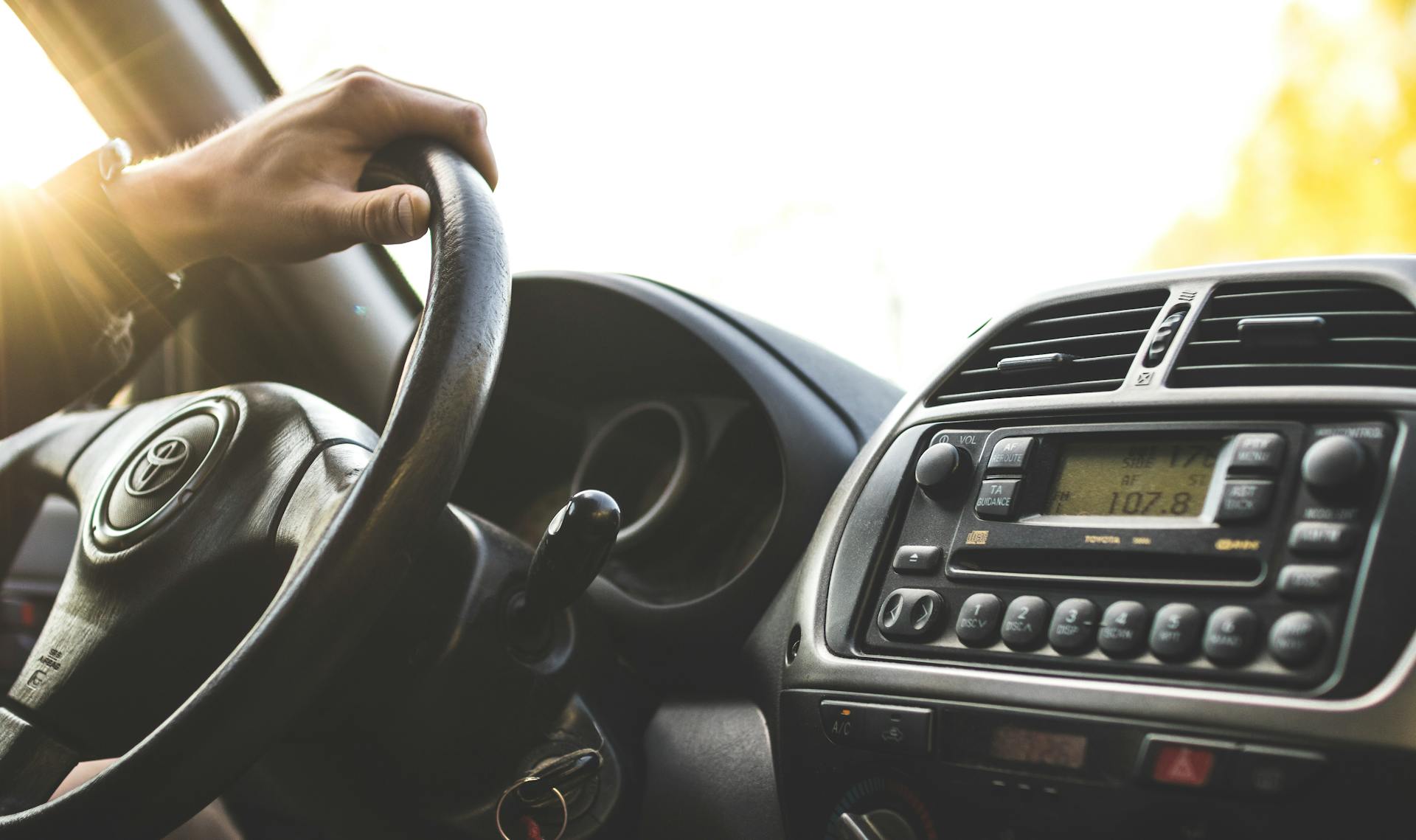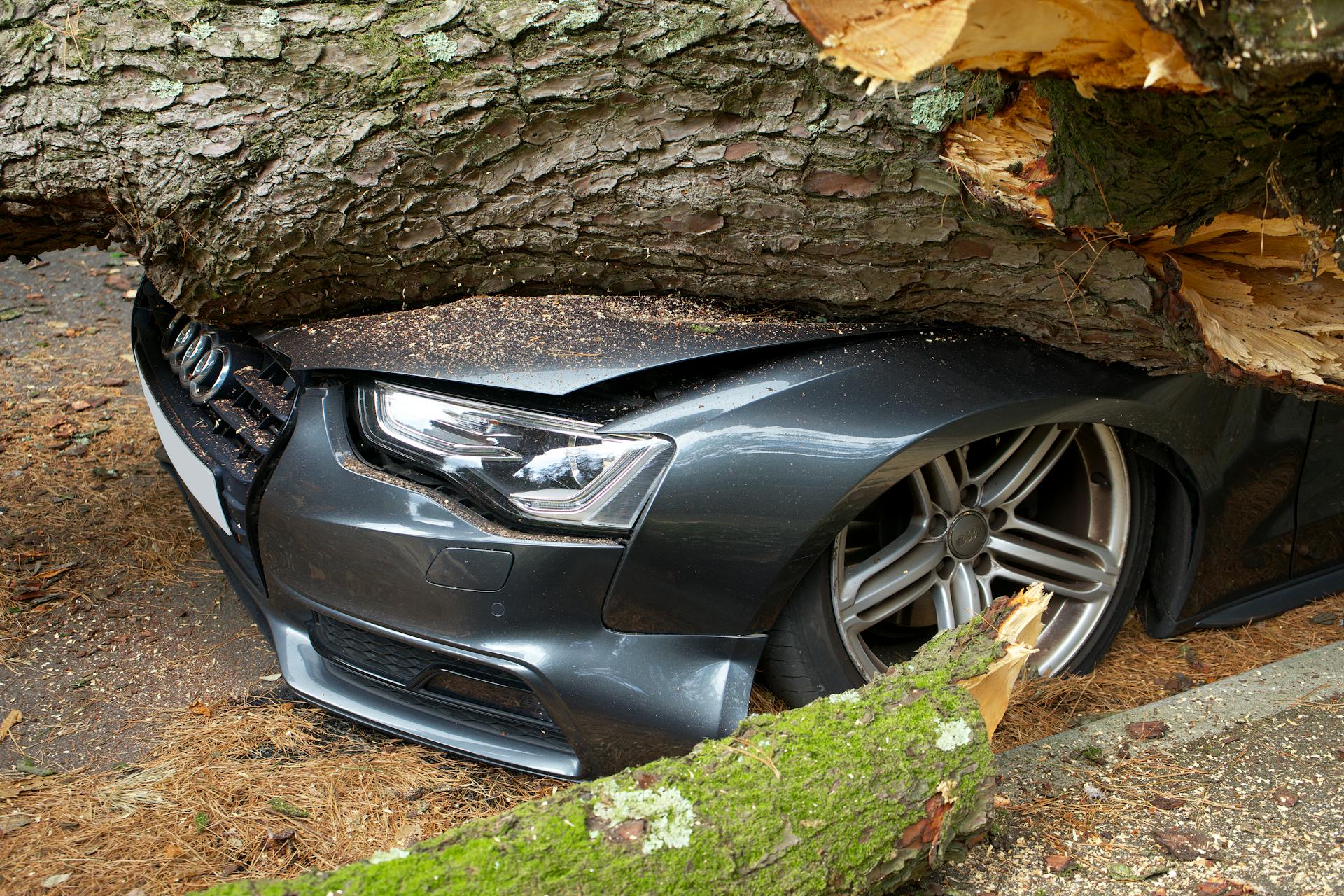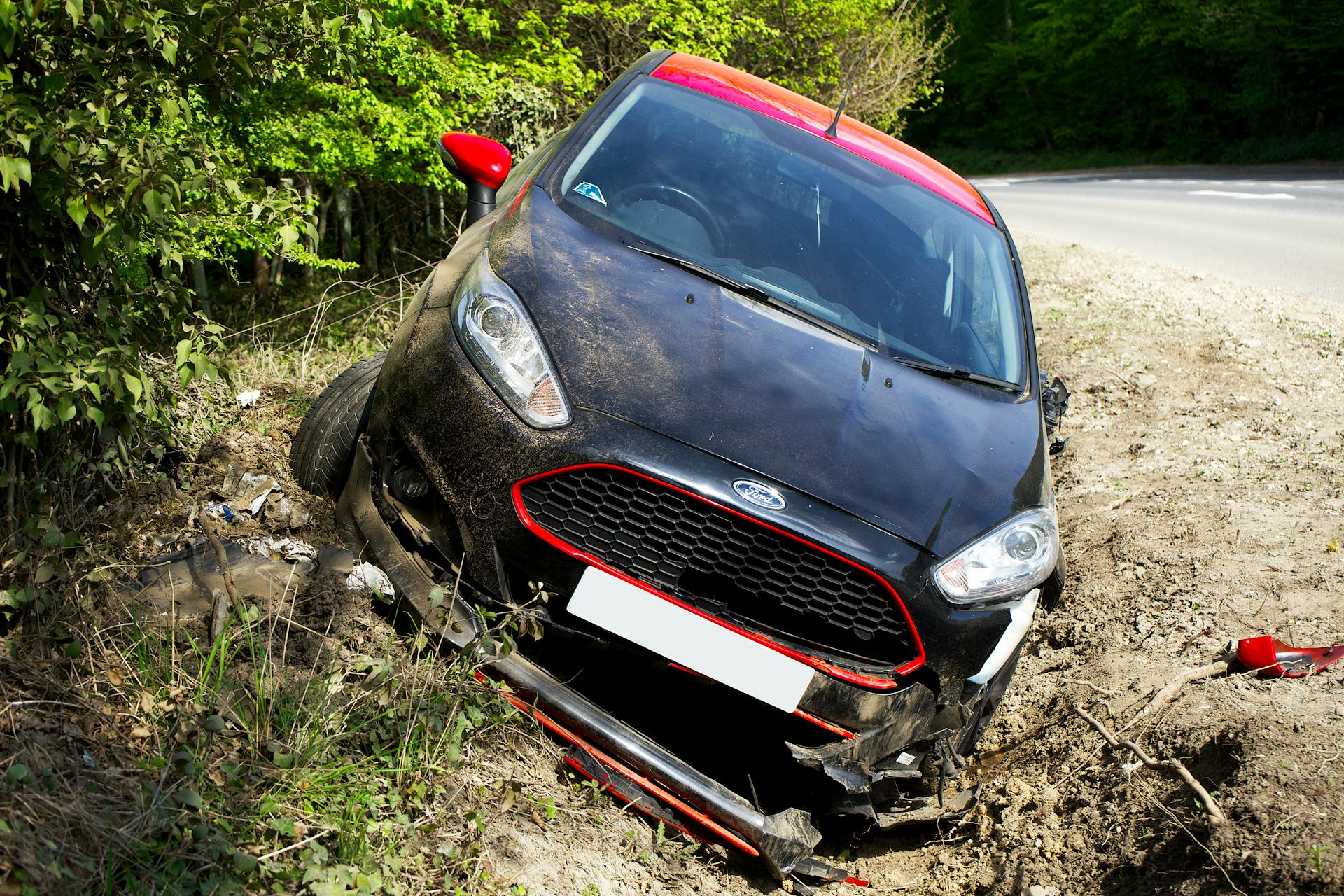
Natural disasters and acts of God can be devastating to your vehicle and finances. Most car insurance policies cover damage caused by natural disasters, but the specifics vary by policy.
Hurricane-force winds, for example, are often covered under comprehensive insurance, which pays for damage to your vehicle that's not related to a collision. This can include damage from fallen trees, flooding, and other hurricane-related hazards.
Comprehensive insurance typically covers damage from earthquakes, landslides, and other geological events as well. However, the extent of the coverage depends on the policy and the specific circumstances of the disaster.
If you live in an area prone to natural disasters, it's essential to review your insurance policy to understand what's covered and what's not.
For your interest: What Does Auto Insurance Not Cover
Legal Term
In legal contracts, an "Act of God" clause is often included to excuse parties from liability or performance obligations when such events occur. This clause is a form of protection against situations where fulfilling a contract becomes impossible or impracticable due to events outside the parties' control.
An Act of God event is typically beyond reasonable control and can include natural disasters like floods, hurricanes, earthquakes, and more. These events are unpredictable and unpreventable, and they occur without human intervention.
In insurance, an Act of God refers to any event that occurs outside of human control and can't be predicted or prevented. Natural disasters such as earthquakes, severe weather, and floods are all considered acts of God.
The inclusion of an Act of God clause helps determine the responsibilities and liabilities of the involved parties when faced with extraordinary circumstances beyond their control. This clause is often used in various types of insurance, including car and homeowners insurance.
Here's a list of examples of Act of God events:
- Floods
- Hurricanes
- Earthquakes
- Severe weather
Note that not all events caused by nature are considered Act of God events. For example, a fire caused by poor wiring is not an Act of God, but one caused by a lightning strike is.
Additional reading: Does Homeowners Insurance Cover Damage Caused by a Contractor
Car Insurance Coverage
Comprehensive coverage is a crucial part of car insurance that pays for damages to your vehicle caused by anything other than a collision. This includes natural disasters, vandalism, fire, and terrorism.
You can opt to add comprehensive coverage to your car insurance policy, which will protect you from natural disasters and other unpredictable events. GEICO covers natural disasters under comprehensive coverage, so you can rest assured that you're protected.
If your vehicle is damaged in a natural disaster, you'll need to file a claim with your auto insurance company. Be sure to take pictures of the damages from every angle or take a video to show the extent of the damage.
Comprehensive coverage typically costs an average of $184.14 annually, and while filing a comprehensive claim may increase your premiums, it's a small price to pay for the peace of mind that comes with knowing you're protected.
Here are some examples of natural disasters that are covered under comprehensive coverage:
- Earthquakes
- Floods
- Hail
- Hurricanes
- Lightning strikes
- Sinkholes
- Wildfires
Out-of-State Disasters
If your car is damaged from a natural disaster while out of state, your insurance will still cover your vehicle. This is because comprehensive coverage is designed to protect you from damages caused by anything other than a collision, regardless of where the incident occurred.
You can file a comprehensive claim for damages from a natural disaster even if your car was damaged in another state. First, keep calm, and then follow the steps to file a claim.
Comprehensive coverage is the key to having your insurance cover natural disasters. If you lack comprehensive coverage, your provider won't cover damages from natural disasters.
GEICO covers natural disasters under comprehensive coverage, which is an optional coverage you can add to your policy. This means that if you have comprehensive coverage with GEICO, you'll be protected from damages caused by natural disasters.
If your vehicle is damaged by a natural disaster, take pictures or videos of the damages from every angle to use as evidence when filing a claim. Don't move the car until the appraisal from the insurance company has been completed, and don't attempt to fix any damages before speaking to the insurer.
For more insights, see: Does Car Insurance Cover Natural Disasters
Insurance Options
Insurance options are available to help protect your vehicle from acts of God. Both auto insurance and homeowner's insurance policies can cover damage related to natural catastrophes such as lightning strikes, flood damage, and high winds.
If you don't already have comprehensive coverage, you can add it by getting quotes from multiple auto insurance companies, talking to an agent or broker, and choosing your deductible and limit. Your comprehensive coverage will come with an insurance deductible, which averages $500 but can range from $0 to $2,000.
To get comprehensive coverage, you'll also need to choose a limit, which is the maximum amount your provider will pay for damage in a covered comprehensive claim. This can range from $10,000 to $100,000 or more, depending on your premium.
On a similar theme: Does Bcbs Cover Auto Accidents
What Kind of Policy?
So, you're wondering what kind of policy you need to protect yourself from acts of God and natural catastrophes. Standard auto insurance policies cover damage related to lightning strikes, flood damage, high winds, and earthquakes.

Your standard homeowners' policy will likely cover damages caused by hail, wind, wildfire, and fire and smoke. But, it's essential to read your policy carefully, as some insurers may exclude coverage for certain events, like earthquakes and floods.
If you live in an area prone to flooding, consider applying for flood insurance through the National Flood Insurance Program (NFIP). This program is managed by FEMA and can help reduce the impact of floods.
Do You Need Coverage?
Comprehensive coverage is a must-have to fix damages from natural disasters, but it's not a requirement anywhere in the U.S.
Some people may opt out of comprehensive coverage, but it's essential to consider the risks of not having it.
In the U.S., comprehensive coverage is not mandatory, giving you the freedom to choose what works best for you.
Natural disasters can cause significant damage, and comprehensive coverage helps you repair or replace your property.
You should carefully weigh the pros and cons of comprehensive coverage before making a decision.
It's crucial to consider your location and the likelihood of natural disasters in your area before deciding on coverage.
A fresh viewpoint: Does Liability Insurance Cover Natural Disasters
How to Obtain

To obtain insurance, you'll want to consider getting quotes from multiple auto insurance companies to compare pricing. This can help you save money, even if you already have insurance.
Talking to an agent or broker can also be helpful in obtaining the right coverage for your needs. They can guide you through the process and help you make informed decisions.
Choosing the right deductible is crucial, as it can range from $0 to $2,000. Make sure you have this amount available in case of an accident or damage.
Selecting a limit for your comprehensive coverage is also important, with options ranging from $10,000 to $100,000 or more. This will determine the maximum amount your provider will pay for damage in a covered claim.
To get started, you'll need to pay your premiums on your policy's effective date. This will begin your coverage and ensure you're protected in case of an emergency.
Here's a quick rundown of the key steps to obtain insurance:
- Get quotes from multiple auto insurance companies.
- Talk to an agent or broker about your coverage options.
- Choose your deductible and limit.
- Pay your premiums on your policy's effective date.
Can You Sue?
You can sue for an Act of God in Texas if you have an insurance policy that specifically includes Act of God insurance, but your insurance company refuses to pay.
In most cases, you can't sue someone for an Act of God because these events are unpredictable and highly devastating, and nobody is responsible for them.
If you do have coverage, the main reason people pursue lawsuits is when their insurance company tries to avoid paying for damages resulting from an Act of God.
You can only sue your insurance company if they're refusing to pay out on a claim, not the actual cause of the damage itself.
Here are some scenarios where you might be able to sue for an Act of God in Texas:
- Your insurance policy specifically includes Act of God insurance, but your insurance company refuses to pay.
- You hit a deer, or a tree falls on your car, but your insurance company tries to avoid paying for the damages.
Sources
- https://www.reichandbinstock.com/insurance-contract-claims/houston-property-damage-lawyer/act-of-god-insurance/
- https://www.autoinsurance.com/coverage/natural-disasters/
- https://newsroom.statefarm.com/auto-policy-survey-findings/
- https://elmersautobody.com/does-car-insurance-cover-a-natural-disaster/
- https://www.valuepenguin.com/property-insurance/act-of-god-insurance
Featured Images: pexels.com


